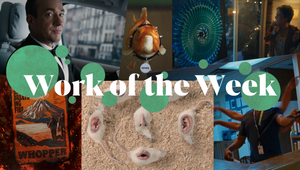
Transforming Automotive Marketing with a Little Help From Our Friends

James Watson and Francis Crick changed the world in the 1950s when they made huge breakthroughs in understanding the structure of DNA. Watson was a geneticist and Crick, a physicist. Together they discovered the double helix, one of the most influential findings of the 20th century.
It’s not hyperbole to say that smart partnerships can change the world. And in the fields of science and technology, it’s the way that advancement has happened for centuries.
For the automotive industry, innovative partnerships are becoming ever more common, both in and outside of marketing comms. So what should brands be thinking about when they consider teaming up with another brand? And more importantly, where can the best connections be made?
Not since Ford’s assembly line has such fast-paced change occurred in the industry. The ‘00s were the era of the hybrid car, ten years later came the ‘connected car’ and now 2016 goes down in history as the year that the first driverless car took to the road - without a human passenger in tow. It all adds up to an ever-evolving challenge for the way brands communicate.
And it means there’s never been a better time to start tapping into outside expertise. Partnerships – whether for content distribution or the creation of a co-branded product – allow automotive brands to explore new territories. They garner new perspectives, they go beyond established ways of thinking. Like all great collaborations, the end result is greater than the sum of its constituent parts.
Collaborative content
This becomes all the richer when we consider car makers partnering with brands outside of the automotive sector. Through this, brands can access the authentic ideas that not only attract customers, but represent genuine value for them too.
Best-in-class examples - like Red Bull and Go Pro, Apple and Nike, Vice and Intel - work so well because both brands in the partnership combine to enhance the customer experience. And this mentality easily translates into the automotive sector.
Ford tapped into just that opportunity when they partnered with publishing giant, Hearst. Together, they told stories under the ‘Built Ford Tough’ banner – over 120 editorial pieces of content that gave practical tips and advice to Ford owners – distributed under titles like Esquire and Popular Mechanics.
Then there was Zipcar. The hire car service is predominantly used in the city, by those who don’t own their own car but still need one from time to time. They partnered with Atlas Obscura to create ‘Escape Plans’ – bespoke day trips that gave customers access to experiences and locations they couldn’t reach without a car, like ‘Castles of the Commonwealth’, ‘A Tour of Tech History’ and ‘The Inventor’s New York’.
And it’s by treating brand partnerships as collaborative occasions to create content that automotive companies can reach the right audiences in the right places in the right ways.
Your most important partner is the customer
But what if brand partnerships could do more than increase brand awareness and even advocacy? What if they could actually help the customers they are designed for? Automotive brands are already branching out into tactical partnerships. And this is where things get really interesting. These co-branded efforts tap into shared values and can even result in new products.
Last year, Audi teamed up with Amazon Prime to solve the issue of missed deliveries – and crucially advertised the security and usefulness of their keyless access technology feature in the process. The partnership allows parcel deliveries to be deposited into the owner’s Audi boot, taking the car beyond its original function and making it more useful for everyday life.
This month, Bentley partnered with Filld to trial an on-demand fuel-delivery service. Customers open the app and order their fuel to be delivered at any time and to any place. So for luxury, time-poor customers, filling up is one thing they don’t have to worry about.
The ultimate dinner party guest
So publishers, connected tech brands, even entertainment brands have already yielded great results. But what’s the next step in the hunt for dream automotive partnerships?
One avenue yet to be fully explored is that of the quantified self. We’re desperate to measure so many things about ourselves, especially when it comes to health and fitness – our step counts, our diets, the length of our bike rides or runs.
The next logical step is to apply this to the driving experience. How long have I been sat down for and what’s the effect on my health? How fast am I going, is that OK in this area? What features are available to quantify my safety? Connecting with devices like a Fitbit, the car’s speedometer and even the tyre grip will be crucial to understanding our performance on the road. Whilst brands like Aviva have already begun exploring these possibilities, you can foresee some really exciting and innovative partnerships with automotive brands.
Other partnerships to consider are those that promote a contextualised, personalised experience. Cars that make customers’ lives easier and more effortless will win the sector. Whilst back-seat movies have already been done to death, brands could branch out into partnerships with gaming giants to provide engaging activities for bored kids or long journeys. Add into that mix the potential for AR and VR to make the car itself a destination, and the sky really is the limit. Especially as the launch of driverless cars promises to make every person in the car a passenger and front-seat entertainment takes on far greater importance.
Indeed, tech giants like Samsung and Apple have recently dominated the automotive conversation, as they make aggressive moves into the sector. Samsung purchased Harman for an estimated £8 billion earlier this year, whilst Apple has been the subject of intense speculation around alleged takeover talks at both McLaren and Tesla. One thing is clear - the appetite for tech innovation in cars is there, so it’s up to automotive brands to take the initiative and guide the conversation, so as not to be pushed out of their own market.
The bottom line
So for automotive brands still unsure of whether partnerships are for them, the message is make a leap – albeit a very carefully considered one. Sourcing a relevant, contextualised, strategic partnership might feel like a race against everyone else in the sector, but the rewards for those who do it properly will be huge. After all, the correct partnership can help offer customers the kind of experience that will generate loyalty and advocacy amongst drivers.
And by accessing partnerships that treat cars like a service, rather than a product, automotive brands can get into the hearts and minds of their customers. Once they’re there, they can reap the rewards of creating genuinely useful, life-enhancing experiences. Let the race begin…













